Fall Interns Team up for Ocean Science Research Experiences
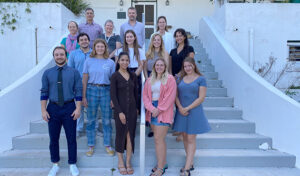
For 12 weeks last fall, a group of nine undergraduate students took part in the National Science Foundation Research Experiences for Undergraduates (REU) program at BIOS. This annual program pairs students with BIOS faculty and research staff, allowing participants to undertake research projects while also gaining fundamental skills such as experimental design, record-keeping, scientific writing, and public speaking. Last year featured a new collaborative program design around three broad research themes: biological production and exports, coral reef systems ecology, and plastics in the marine environment.
In 1991, BIOS became a site for the competitive and prestigious National Science Foundation (NSF) Research Experiences for Undergraduates (REU) program, which provides participants with the opportunity to work alongside the Institute’s faculty and staff on research projects in a variety of topics in ocean sciences.
The 2021 cohort of nine undergraduate students marked the program’s 30th anniversary. The students represent universities in eight states and Puerto Rico and are pursuing a diverse set of majors, including engineering, environmental sciences/studies, physics, biological sciences, geosciences, and biochemistry.
Last year, the BIOS NSF REU program operated in a new format, in which participants conducted collaborative research projects in groups within three broad research themes: biological production and exports, coral reef systems ecology, and plastics in the marine environment. Each intern’s project addressed one aspect of a larger research question, allowing the students to work closely with other group members, as well as their faculty mentors, throughout the duration of the 12-week program.
Here BIOS’s 2021 REU interns provide a description of their research projects and share personal reflections from their time at the Institute.

Olivia Dudley is a fourth-year student at New York University in New York City where she majors in environmental studies and minors in environmental biology and animal studies. After graduating, she plans to pursue a graduate degree in environmental sciences and conservation. During her time at BIOS she worked with microbial ecologist Rachel Parsons and environmental chemist Andrew Peters on a project investigating the influence of color on the abundance of microbial colonization on plastics in sea water. The theory behind her study was that marine microbes might be attracted to certain colors, possibly due to the chemical additives used in the production of the dyes. Research on this subject could aid in policies regarding the production of colored plastics.
“This internship provided me with a new view of science that I had never witnessed before and clarity for my future career aspirations,” Dudley said. “It provided me with new research skills [and] built upon those that I have already acquired.”
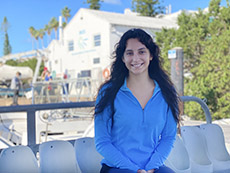
Siarah Hall is a third-year student at Texas A&M University at Galveston, Texas where she pursues a double-major in marine science and marine biology. Prior to interning at BIOS, she led a project to develop a universal procedure that detects changes in water quality due to human activities. Siarah plans to continue her studies in graduate school and ultimately work as a researcher in marine science, while serving as an advocate for conservation and sustainability. For her REU project, Siarah worked with reef systems ecologist Eric Hochberg, benthic ecologist Yvonne Sawall, and research specialist Tim Noyes studying the light use efficiency of reef communities, or how efficient each community is at using light for photosynthesis. She used data collected from the NASA-funded COral Reef Airborne Laboratory (CORAL) mission, which—for this study—included 32 sites in the Main Hawaiian Islands, the Great Barrier Reef, the Marianas, and Palau. She combined efficiency data with benthic cover data (how much of the sea floor is covered by coral, algae, or sand) to get estimates of the efficiency of each benthic type. Her work will form the basis of a future peer-reviewed publication by CORAL scientists, for which she will be listed as a co-author.
“My time at BIOS was beneficial on so many levels,” said Hall. “I feel like I grew academically, professionally, and socially. I learned more than I thought was possible in three months, and I made professional connections that I know will prove to be beneficial later in my career.”
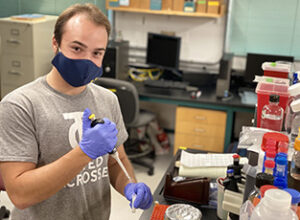
Jacob Harrison is a fourth-year environmental engineering student at the University of Michigan in Ann Arbor, Michigan. Recently, he served as an environmental health technician for COVID-19 clinics and as a member of a student organization focusing on the dissemination of prenatal health information to women in impoverished areas of Bangladesh. At BIOS, Jacob worked with marine microbiologist Rachel Parsons and environmental chemist Andrew Peters to investigate the effects of common marine plastic leachates (chemical additives released from the plastic polymer) on ocean microbial communities. He used a number of molecular techniques to demonstrate the microbial degradation of carbon and the key microbial species that benefit from environments that contain high amounts of plastic.
“This internship helped me gain valuable field and research experience, develop communication skills, and grow an increasingly diverse network,” said Harrison. “I feel more prepared to make decisions about my future career path.”
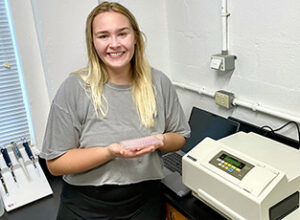
Kelly Koehler is a third-year student at North Carolina State University in Raleigh, North Carolina where she pursues a double-major in biology and zoology and a minor in applied ecology. She became interested in marine sciences and benthic ecology when she led a semester-long project assessing mass mortality events in eastern oysters. During her time at BIOS, Kelly worked with reef systems ecologist Eric Hochberg, benthic ecologist Yvonne Sawall, and research specialist Tim Noyes. For her project, she measured two reef processes that are part of coral reef metabolism—respiration and photosynthesis—using what is known as the gradient flux approach. This approach requires hourly and daily measurements over a period of days at multiple depths on the reef. The goal of Kelly’s project was to assess daily metabolic rates, and to investigate how reef community composition, light, and water flow affect coral reef metabolic rates.
“The BIOS REU program is an incredible experience for undergrads because students are responsible for a project that undergoes the entire research process,” said Koehler. She added that “the collaborative environment at BIOS allows for a great learning environment that helps young researchers develop their communication and teamwork skills, which are just as important as technical research skills.”
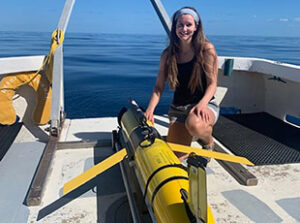
Sarah Lehman is a fifth-year student at The Pennsylvania State University in University Park, Pennsylvania where she is working on a double-major in geosciences and biology. Prior to her REU internship at BIOS, she interned at the Pennsylvania Department of Conservation and Natural Resources and the Central Pennsylvania Research and Teaching Laboratory for Biofuels. At BIOS, Sarah worked with physical oceanographer Ruth Curry and biogeochemical oceanographer Damian Grundle on a project that paired data gathered by underwater gliders with ship-based observations to characterize the water column of the Sargasso Sea. Specifically, she looked at oxygen concentrations in the upper 1,300 feet (400 meters) to better learn where biological production and respiration is occurring. This information helps scientists answer long-standing questions about the biological carbon pump—a process by which marine organisms take inorganic carbon dioxide from the atmosphere, convert it into organic forms of carbon, then transfer and store these forms within the ocean’s deeper layers.
“My time at BIOS taught me so much about what a career in research can look like,” Lehman said. “I learned a lot about oceanography and improved my technical writing, presentation, and research skills.”
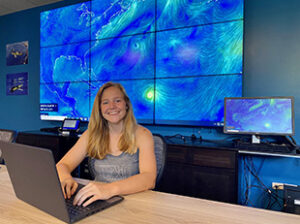
Kaitlyn Lindholm is a fourth-year biological engineering student at the University of Idaho in Moscow, Idaho. During the summer of 2021 she completed a research project at Washington State University investigating how much carbon dioxide can be absorbed by bioluminescent algae, a marine plant that “glows” by way of the same chemical reactions that make fireflies light up. For her REU internship at BIOS, she worked with physical oceanographer Ruth Curry and biogeochemical oceanographer Damian Grundle on a project investigating the biological carbon pump in the Sargasso Sea. The focus of her project was marine phytoplankton and how their seasonal distribution affects the carbon pump process. Kaitlyn also investigated how measurements from autonomous gliders can be used to characterize phytoplankton communities and their associated carbon biomass.
“This internship opened up my view on future career opportunities and increased my confidence in my abilities to complete a successful research project,” said Lindholm. “I would highly recommend an internship at BIOS, it was one of the best times of my life.”
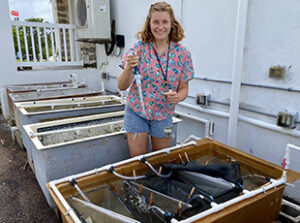
Margaret Lockwood is a fourth-year physics student at the University of Kansas in Lawrence, Kansas planning to attend graduate school to study microbiology. In summer 2021, she completed an REU internship at the University of Alaska, Fairbanks investigating the impacts of permafrost thaw on microbial communities in the soil. During her time at BIOS, she worked with microbial oceanographer Rachel Parsons and environmental chemist Andrew Peters on a project investigating the microbes that live on marine microplastics. Her project used microscopy techniques to look at the impact of light on the microbes, as previous studies indicated that light breaks down the plastic and impacts the microbial communities. Such research is relevant as plastics are becoming more abundant in the ocean, and microbial communities influence ocean ecology and chemical cycles.
“I learned an incredible amount through my project, speaking to my peers, and talking to BIOS staff,” said Lockwood. “The people I connected with through my time at BIOS, undoubtedly, were the most influential and best part of the experience.”
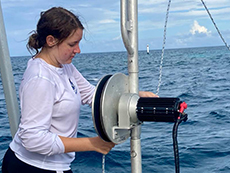
Margaret Lockwood is a fourth-year physics student at the University of Kansas in Lawrence, Kansas planning to attend graduate school to study microbiology. In summer 2021, she completed an REU internship at the University of Alaska, Fairbanks investigating the impacts of permafrost thaw on microbial communities in the soil. During her time at BIOS, she worked with microbial oceanographer Rachel Parsons and environmental chemist Andrew Peters on a project investigating the microbes that live on marine microplastics. Her project used microscopy techniques to look at the impact of light on the microbes, as previous studies indicated that light breaks down the plastic and impacts the microbial communities. Such research is relevant as plastics are becoming more abundant in the ocean, and microbial communities influence ocean ecology and chemical cycles.
“I learned an incredible amount through my project, speaking to my peers, and talking to BIOS staff,” said Lockwood. “The people I connected with through my time at BIOS, undoubtedly, were the most influential and best part of the experience.”
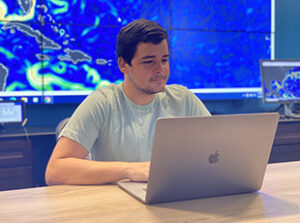
Orlando Rios Cortes is a fourth-year student in environmental science at the University of Puerto Rico. Throughout his undergraduate education he has studied a broad range of subjects, including the water transport system in plants and dissolved organic matter in rivers. For his REU project at BIOS, Orlando worked with physical oceanographer Ruth Curry and biogeochemical oceanographer Damian Grundle on a project that combined measurements from autonomous gliders and the Bermuda Atlantic Time-series Study program. Specifically, he characterized physical and chemical processes, such as nutrient delivery and rates of mixing, taking place in the waters offshore of Bermuda on timescales of hours to days to over a full year. Research such as this provides crucial information about the biological productivity of the marine ecosystem and helps scientists gauge the benefits of using autonomous technologies to study anthropogenic phenomena, such as global warming.
“BIOS has been a remarkable experience,” said Rios Cortes. “I was able to do innovative research while learning computer science skills. I would highly recommend this experience to students interested in pursuing graduate school because it will change your life.”
